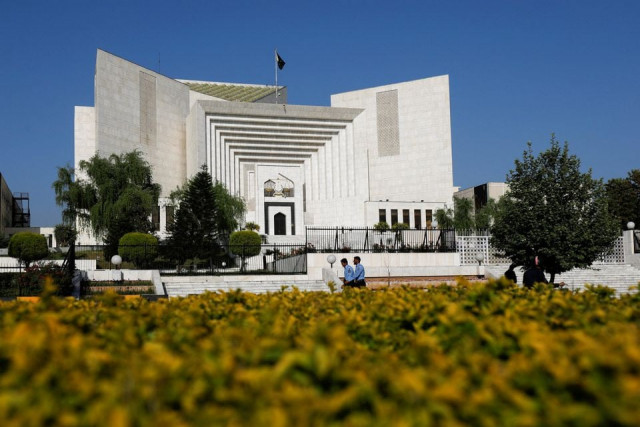CJ Isa favours ‘original Constitution’
SC reserves decision in MPs’ lifetime disqualification case

The Supreme Court (SC) on Friday reserved its decision in the matter related to the re-examining of the lifetime disqualification of lawmakers under Article 62 (1) (f) of the Constitution with Chief Justice of Pakistan Justice Qazi Faez Isa favouring the “original Constitution”, lamenting "encroachments" made into the country's bill of rights over the years.
“We are disregarding the fact that why these amendments were brought into the Constitution. We are disregarding the fact that the original Constitution has a greater sanctity than amendments brought unless there are such amendments which enable to serve the people better,” Chief Justice Qazi Faez Isa while heading a seven-member larger bench said.
The bench also comprising Justice Syed Mansoor Ali Shah, Justice Yahya Afridi, Justice Aminuddin Khan, Justice Jamal Khan Mandokhail, Justice Muhammad Ali Mazhar and Justice Musarrat Hilali resumed hearing a set of petitions to determine the disqualification period of lawmakers.
The CJP said, “We will try to come up with a shorter order as soon as possible. Probably not today but it will be very soon God willing.”
The inconsistency between court decisions and parliamentary legislation regarding the duration of disqualification under Article 62(1)(f) has prompted the apex court to intervene and determine whether the disqualification of a lawmaker should be for a lifetime or five years stipulated in the Elections Act.
The disqualification conundrum stems from the addition of Article 62(1)(f) to the Constitution by former military ruler Gen Ziaul Haq. However, the issue gained prominence when a larger bench of the Supreme Court disqualified former prime minister Nawaz Sharif for life in the Panama Papers case.
In June last year, parliament introduced an amendment to Section 232 of the Elections Act, setting the period of disqualification to five years under Article 62(1)(f). This legislative move adds a layer of complexity to the matter that the Supreme Court is now set to unravel.
During the hearing, Chief Justice Isa said, "The original Constitution has greater sanctity.” He lamented "encroachments" made into the country's bill of rights over the years.
As the hearing commenced, Istehkam-e-Pakistan Party Patron-in-Chief Jahangir Tareen's counsel Advocate Makhdoom Ali Khan was called to the rostrum.
He began his arguments by stating that the Samiullah Baloch case led to a disconnect between articles 62 and 63, adding that two different considerations prevail as the language of Article 63 is different from that of Article 62.
Justice Mansoor observed that in the Samiullah case, the declaration was obvious but the duration of disqualification remained unclear.
When Justice Mandokhail asked if a civil court could issue a declaration of disqualification, the counsel said it could not.
He added that the Constitution keeps the issue of disqualification and qualification separate.
Justice Mazhar then asked if Article 62 applies to pre-election, post-election or any other time.
The advocate replied, “Article 62 is only applicable at the time of elections while Article 63 can be applied at any time it is deemed fit to be used.”
CJP Isa then interjected that the constitutional history of the country was being disregarded.
He observed that successive "encroachment" was made into Pakistan's Constitution, noting that despite advertisements given in newspapers, no political party had come forth stating that this was a good interpretation of the Constitution.
Tareen's counsel then stated that parliament did not mention that the declaration would be forever in the 18th Amendment.
After hearing all the arguments, the court reserved its verdict in the case.


















COMMENTS
Comments are moderated and generally will be posted if they are on-topic and not abusive.
For more information, please see our Comments FAQ